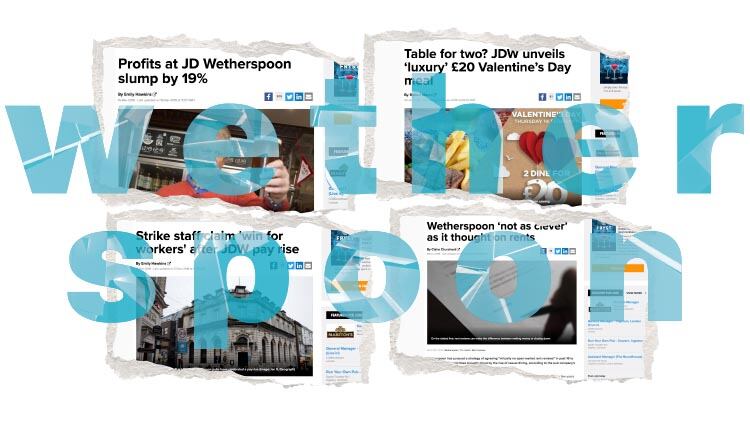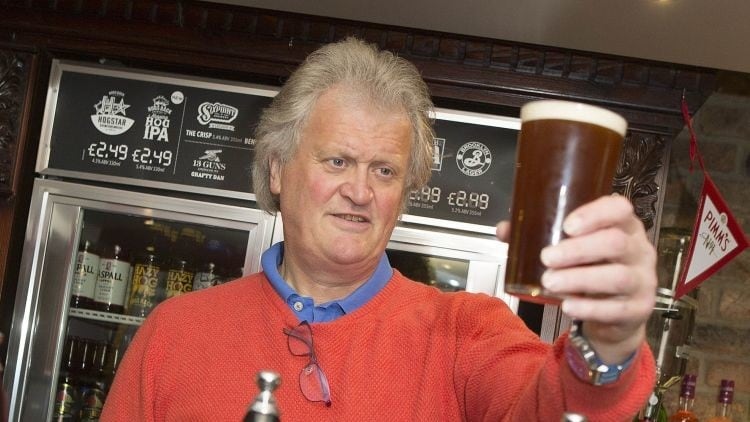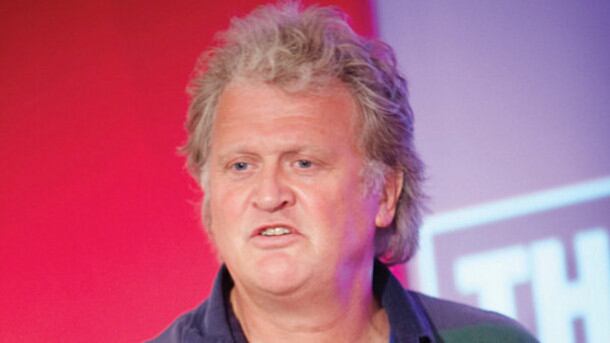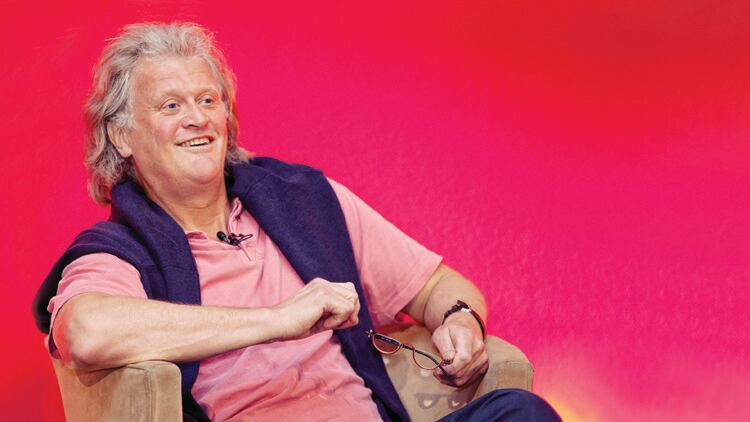It’s no secret that 900-strong pub giant JD Wetherspoon’s (JDW) large estate is popular with customers and its cheap prices help keep punters coming back and the tills ringing.
However, recently the business has put a number of pubs up for sale, upped its prices and reported a drop in profits.
The company also confirmed it was increasing the price of its food and drink for the fifth time in two years.
JDW spokesman Eddie Gershon confirmed prices will vary between pubs and there has been an approximate 5p increase on a coffee but he emphasised there are still free refills at all pubs.
There has also been about a 10p increase on meal deals (meals that include a drink), so in effect, there is a 5p increase on meals and 5p increase on drinks.
He said: “Our customers love the excellent range of great-quality meals at our pubs and we are certain they will enjoy the new meals we have added to the menu.
“We believe we continue to offer excellent value for money meals in our pubs.”
JDW confirmed it is putting 16 pubs on the market through CBRE and Savills earlier this month (March). Gershon said: “We totally understand our loyal customers and staff will be disappointed with this decision. However, JDW does, on occasion, put some of its pubs up for sale.
“It is a commercial decision taken by the company after long consideration. The pubs will continue to trade as normal until a buyer is found.
“We have told our staff that if the pub is sold and they do not transfer to the purchaser then we would look to redeploy our employees at other JDW pubs in the region.”
Most recently, the company revealed its profits had fallen by 18.9% in the six months to the end of January 2019, despite a boost in sales.
Pre-tax profits fell to £50.3m, down from last year’s figure of £62m. However, like-for-like sales increased by 6.3% with total sales rising to £889.6m.
The pubco pointed to rising costs, in particular labour, which increased by £33m. The costs of repairs, utilities and depreciation also ate into profits.
Costs to rise
Chairman Tim Martin said these costs were set to rise further. He explained: “As previously indicated, costs in the second half of the year will be higher than those of the same period last year.
“The company anticipates an unchanged trading outcome for the current financial year.”
Bar sales saw a like-for-like increase of 5.9% and food sales increased by 7.1%. Gaming machines also experienced an income boost of 5.7%.
The chain experienced a like-for-like sales increase of 9.6% in the six weeks to 10 March 2019.
Total sales in this period increased by 10.9%, something Martin said was encouraged by “excellent weather this year and snow last year”.
Meanwhile, Martin has been a strong advocate for leaving the EU without a deal and used the pubco trading update to reiterate his feelings.
He said there had been “a barrage of negative economic forecasts” from universities, politicians and the media, on what would happen if the UK left without a deal.
“The doomsters ignore the most powerful nexus in economics, between democracy and prosperity,” he said.
Martin added that both leaving with Theresa May’s deal and remaining in the EU could result in “significantly adverse economic consequences, as the country turns in on itself to endure months, or years, of stifling constitutional argument”.
Not immune
Business experts gave their view on JDW, and Mintel senior foodservice analyst Trish Caddy was positive about the pub giant.
She said: “Despite the gloomy headlines, JDW sales are up 6% and Mintel data shows consumers feel pretty positively about the brand.
“Its main challenges relate to an increase in running costs rather than anything consumer-focused. It seems JDW is merely taking stock and slowing down its expansion rate to focus on maintaining trading levels at its more profitable sites.”
However, Caddy also outlined how economic factors have impacted the business and how consumers are changing their habits.
She added: “Of course, JDW is not immune to the wider challenges faced by the eating-out market. In a climate where restaurant groups are retrenching, operators have to work hard as consumers are more choosy and less likely to gamble on where they spend their money.”
While JDW denied it was a ‘brand’, following its success at the 2018 World Branding Awards, Caddy laid out how the business needs to ensure it is showcasing what it offers to punters.
“Gone are the days of pubs or restaurants’ one-size-fits-all business model. Brands have to decide if they want to go back to basics and provide intimate dining experiences for older diners or become a third space for young people to hang out over food and drink,” she said.
“It is also important that brands exercise ethical due diligence across their operations and supply chains to improve sentiment towards their brand image – as highlighted by seven in 10 consumers who agree that restaurants should demonstrate good ethical practices.
“These can space across sustainability, healthy eating and ethical trading. For example, demonstrating the restaurant pays all tips to its workers, committing to reduce food waste, banning single-use plastic products and reformulating calorific dishes to meet healthy-eating guidelines.
“Our research also found less is more, especially among younger diners. Under-45s don’t want large confusing menu offerings, but prefer higher quality specialised cuisines.
“This is where JDW risks losing its individualism by trying to be everything to everyone with its very wide menu offering including pizza, brunch, curry and coffee.”
Serious decline
Edison Investment Research analyst Paul Hickman was less positive about JDW’s trading results.
He said: “Buried in the, by now, usual diatribes against Brexit, corporate governance and ‘the establishment’ is a serious decline in operating margin from 8.9% to 7.1%.
“Like-for-like sales increased by 6.3% narrowly led by food, which was up 7.1%, head of drink up 5.9% and machines by 5.7%.
“That is not a particularly meaningful achievement, however, because the important Christmas period was trading against last year’s atrocious conditions.
“As a result, despite revenue growth of 7.1% to £889.6m, profit before tax and earnings per share declined 19% to £50.3m and 37.4p respectively.
“Much less comment in the results is devoted to accounting for declines but Martin blames cost increases spread across labour, repairs, utilities, interest and depreciation.
“Costs in the second half are also expected to be higher year on year.
The company anticipates ‘an unchanged trading outcome for the current financial year’ although analysts expect full-year pre-tax profit to slip 5% to £102.1m.”
Similarly, Euromonitor research analyst Valentina Vitali put the profit drop down to the effect of what is happening in the economy.
She said: “With Brexit pushing inflation up and with business rates increasing, having an efficient portfolio of pubs is essential.
“Between 2016 and 2018, the number of bars and pubs in the UK has decreased by nearly 5% with JDW closing approximately 75 venues during the period.
“The ongoing rationalisation of JDW’s estate is a straightforward response to maintain operational efficiency in a period of rising costs
and insufficient revenue.”
Improved experience
She also highlighted how JDW seems to underestimate the importance of having an attractive strategy and the effects of a winning brand proposition on sales.
Vitali added: “Value for money is an equation. If a company heavily plays on the pricing side, as JDW has been doing, the brand can get lost in a huge market.
“With more and more people choosing to drink at home to save money, targeting the price sensitivity of consumers may not pay off.
“Consumers need to have a reason to go out and drink in a pub and this reason is not lower prices.
“Brits prefer to choose venues that satisfy their quest for improved experience and for wider and more sophisticated alcoholic drinks assortments.”
While JDW has seen a turbulent few months, analysts are still optimistic about its future and for a group with a 900-strong estate, JDW doesn’t look like it will be going anywhere any
time soon.




